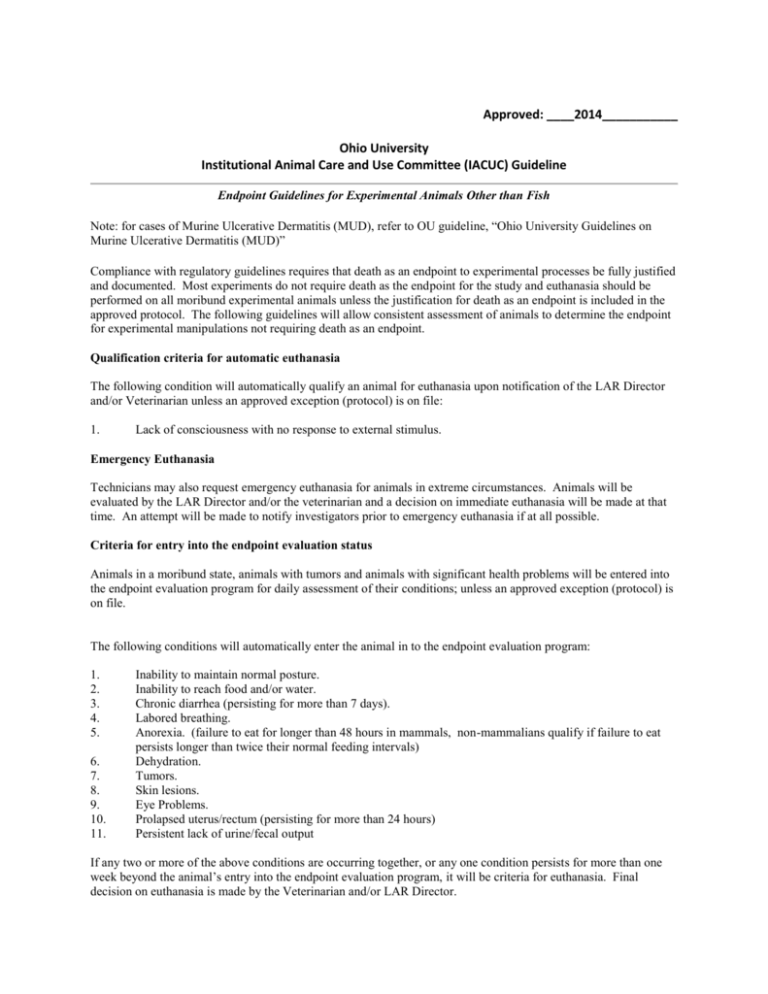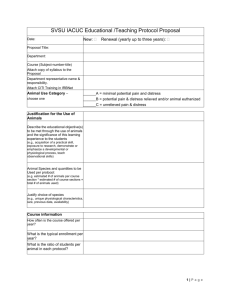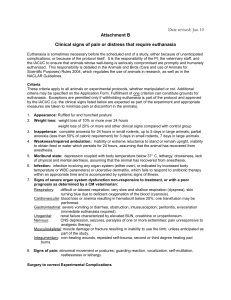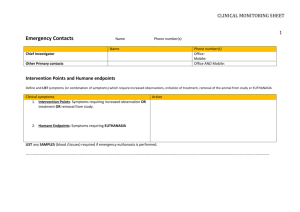Endpoint Guidelines for Experimental Animals
advertisement

Approved: ____2014___________ Ohio University Institutional Animal Care and Use Committee (IACUC) Guideline Endpoint Guidelines for Experimental Animals Other than Fish Note: for cases of Murine Ulcerative Dermatitis (MUD), refer to OU guideline, “Ohio University Guidelines on Murine Ulcerative Dermatitis (MUD)” Compliance with regulatory guidelines requires that death as an endpoint to experimental processes be fully justified and documented. Most experiments do not require death as the endpoint for the study and euthanasia should be performed on all moribund experimental animals unless the justification for death as an endpoint is included in the approved protocol. The following guidelines will allow consistent assessment of animals to determine the endpoint for experimental manipulations not requiring death as an endpoint. Qualification criteria for automatic euthanasia The following condition will automatically qualify an animal for euthanasia upon notification of the LAR Director and/or Veterinarian unless an approved exception (protocol) is on file: 1. Lack of consciousness with no response to external stimulus. Emergency Euthanasia Technicians may also request emergency euthanasia for animals in extreme circumstances. Animals will be evaluated by the LAR Director and/or the veterinarian and a decision on immediate euthanasia will be made at that time. An attempt will be made to notify investigators prior to emergency euthanasia if at all possible. Criteria for entry into the endpoint evaluation status Animals in a moribund state, animals with tumors and animals with significant health problems will be entered into the endpoint evaluation program for daily assessment of their conditions; unless an approved exception (protocol) is on file. The following conditions will automatically enter the animal in to the endpoint evaluation program: 1. 2. 3. 4. 5. 6. 7. 8. 9. 10. 11. Inability to maintain normal posture. Inability to reach food and/or water. Chronic diarrhea (persisting for more than 7 days). Labored breathing. Anorexia. (failure to eat for longer than 48 hours in mammals, non-mammalians qualify if failure to eat persists longer than twice their normal feeding intervals) Dehydration. Tumors. Skin lesions. Eye Problems. Prolapsed uterus/rectum (persisting for more than 24 hours) Persistent lack of urine/fecal output If any two or more of the above conditions are occurring together, or any one condition persists for more than one week beyond the animal’s entry into the endpoint evaluation program, it will be criteria for euthanasia. Final decision on euthanasia is made by the Veterinarian and/or LAR Director. Investigator Notification Investigators will be given a twenty four hour notice to collect tissues or otherwise use the animal prior to its disposal if the animal is not in extreme pain and distress. However, euthanasia for animals meeting the above criteria will be carried out by the laboratory animal care staff automatically with no further warning than the twenty four hours unless a unless an approved exception (protocol) is on file. Monitoring and Record Keeping Animals being monitored for endpoint status will be evaluated by a laboratory animal technician at least once each day, including weekends and holidays. A written record of the observations will be kept on either an observation chart or the cage card. The observation record will be forwarded to the veterinarian and the investigator when the animal is either euthanized or removed from endpoint evaluation status. Tumor Guidelines The following guidelines apply to animals with tumors. 1. 2. 3. Tumors should not exceed 10% of the animal body weight. Animals in which tumors are expected will be weighed prior to the beginning of the experiment and that weight used as a baseline to measure tumor weight. Tumors should not interfere with the ability to move about the cage, or to reach food and water. Animals may be offered food and water on the floor of the cage if they can still move about the cage but not reach the elevated food and water containers. Ulceration of tumors is criteria for euthanasia unless an approved exception (protocol) is on file. Ulcerated tumors will be criteria for immediate euthanasia without this exception.




